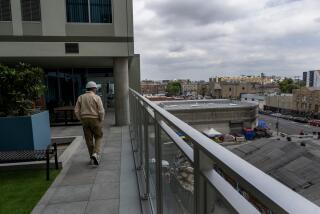Neighbors Express Fears Over Home for Autistic
- Share via
Neighbors are protesting a proposal to use a house on a quiet cul-de-sac in north Glendale as a residential care facility for six autistic adults. They say they fear an increase in traffic, a drop in values of nearby property and the violent behavior by the new residents.
However, officials at the Jay Nolan Center of Canyon Country, the group home’s sponsor, say those fears have little basis in fact. Plans are moving ahead for six men, ages 18 to 27, to move into the four-bedroom house at 301 Parkwood Lane within a week or two.
“I’m just disappointed,” said Glenys Reid, director of residential services for the Nolan Center, which runs nine other such homes in the Los Angeles area. “I thought the community had come a little further in accepting handicapped people in their environment.” She promised that the so-called Parkwood House will make a special effort to blend quietly into the neighborhood.
Fear of the Unknown
Some neighbors complain that they were given little or no warning about the proposal to move in the autistic men. Kimberly Webb, the house’s manager, conceded that the Nolan Center might have done a better job in letting neighbors know about the program. “I think a lot of the opposition comes from fear of the unknown. There are a lot of misconceptions about autism out there, and a lot of that is scary,” Webb said.
A petition with about 120 signatures asked the Glendale City Council to forbid the Nolan Center’s use of the house. In addition, more than a dozen letters of protest were mailed to city officials and planners. Reid said none of the program’s other nine houses faced such local opposition.
A group residence for the handicapped is permitted at that Glendale location under the state Health and Safety Code, which preempts local zoning regulations, according to city officials. But the city can regulate the house for general upkeep, safety and noise.
Fits Zoning Requirements
“Our conclusion at this particular point, and I would emphasize this particular point, is that the property is being maintained and the appearance of the property is not out of character with the residential property in the area,” said Glendale’s zoning administrator, John McKenna. He said his staff will ensure that this continues.
The house appealed to the Nolan Center because Parkwood Lane is a dead-end, where the autistic residents face little danger from automobile traffic. But neighbors say the cars driven by Nolan staff members and family visitors to the house will ruin that quiet setting.
“Parking is our primary objection,” said Harold Woodley, who has lived two doors away for 21 years. “If this was a through street, hey, I’d say welcome. I don’t have anything against autistic people.”
Jeanette Tostevin, who lives in a condominium building next to the backyard of the Parkwood House, said she is worried about the behavior of the autistic. “You really don’t know what they are going to do. If they are so docile, why are parents putting these boys here? It’s because they are unmanageable at home,” she stated. Tostevin said she thinks the program would be better suited for south Glendale, where there are already many nursing and retirement homes.
Reid said her staff made an effort to select six residents for the Glendale house who are not noisy. She conceded that the men may throw temper tantrums or damage some property inside the house as they settle into an unfamiliar setting. But she stressed that the autistic pose no danger to outsiders.
Autism is a rare, severe developmental disorder that can be evident in infancy. Its symptoms include unresponsiveness to other people, abnormal speech, insistence on repetition and odd body movements. Some autistic children have remarkable, although limited skills, in memorization, mathematics or music; many others are also mentally retarded.
Teach Independence
Two or three supervisors will be with the autistic residents at all times, according to Webb. During the day, the autistic men will attend either school or training workshops. The goal is to teach them skills so they can be as independent as possible.
The house was purchased by a man who will lease it to the Nolan Center at a minimal fee, with the understanding that his autistic son can live there, Webb said. She declined to identify the new owner.
Three of the young men will be coming from other group homes and two others from state hospitals. Another, 18-year-old Michael Considine, will be moving from his family’s Pasadena home, where he has lived since leaving another group home last year. He and his mother, Ellie, visited the Glendale house the other day.
Setting Is Important
“It’s like a home, not like an institution and that is very important to our family,” the mother explained. “It is a good opportunity for Michael to learn how to function in the community with his peers. We hope he will be a contributing member of society. We don’t want him institutionalized and a burden to the taxpayers.”
Considine said she understands the neighbors’ concerns about the house and urged them to “give it a chance.”
Laura Lovick, who has lived next door for 21 years and shares a front lawn with the group home, said she remains worried about noise and property values. But, she added: “Now, I’m trying to think positively about this and hope we are able to work it out.”
More to Read
Sign up for Essential California
The most important California stories and recommendations in your inbox every morning.
You may occasionally receive promotional content from the Los Angeles Times.














